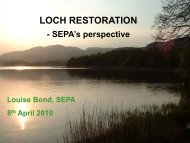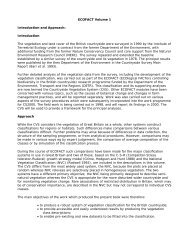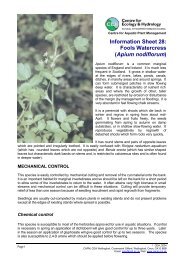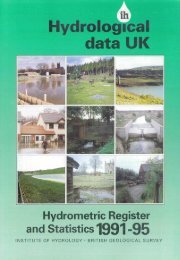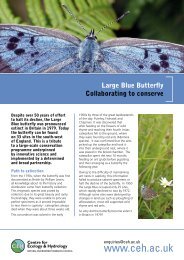Adaptation of soil invertebrate to environmental extremes – in the ...
Adaptation of soil invertebrate to environmental extremes – in the ...
Adaptation of soil invertebrate to environmental extremes – in the ...
You also want an ePaper? Increase the reach of your titles
YUMPU automatically turns print PDFs into web optimized ePapers that Google loves.
<strong>Adaptation</strong> <strong>of</strong> <strong>soil</strong> <strong><strong>in</strong>vertebrate</strong> <strong>to</strong> <strong>environmental</strong> <strong>extremes</strong> <strong>–</strong> <strong>in</strong> <strong>the</strong> Azorean furnace <strong>of</strong><br />
evolution<br />
Supervisors: Dr. David Spurgeon, Dr Elma Lahive<br />
Centre for Ecology & Hydrology, Wall<strong>in</strong>gford<br />
Application Deadl<strong>in</strong>e: 31 January 2013<br />
Start Date: 1 Oc<strong>to</strong>ber 2013<br />
To apply for this studentship please send <strong>to</strong> Dr. David Spurgeon (dasp@ceh.ac.uk) your CV,<br />
details <strong>of</strong> two referees, and a cover letter detail<strong>in</strong>g why you are suited <strong>to</strong> this PhD.<br />
Project Details:<br />
The rapid <strong>environmental</strong> changes imposed by natural phenomena (e.g. floods, volcanoes)<br />
and human activity (e.g. pollution, climate) challenge species <strong>to</strong> adapt or face ext<strong>in</strong>ction.<br />
Understand<strong>in</strong>g such <strong>to</strong>lerance is fundamental <strong>to</strong> species survival. Animals liv<strong>in</strong>g <strong>in</strong> extreme<br />
environments (extremophiles) provide a fantastic resource for understand<strong>in</strong>g adaptation<br />
because <strong>the</strong> mechanisms that <strong>the</strong>y use <strong>to</strong> survive <strong>in</strong> extremis frequently relate <strong>to</strong> those<br />
employed by o<strong>the</strong>r species <strong>to</strong> survive more subtle events.<br />
Volcanoes, even when not actively erupt<strong>in</strong>g, have great impacts on <strong>the</strong> environments that<br />
surround <strong>the</strong>m. The heat<strong>in</strong>g and gas load<strong>in</strong>g (e.g. with CO2) <strong>of</strong> <strong>soil</strong>s on volcanic slopes<br />
provides a set <strong>of</strong> conditions which presents an extreme challenge for species survival. For<br />
example, at sites <strong>in</strong> <strong>the</strong> Azores Islands <strong>in</strong> <strong>the</strong> Atlantic Ocean, populations <strong>of</strong> earthworms and<br />
woodlice are found <strong>in</strong> <strong>soil</strong>s up <strong>to</strong> 45 o C with <strong>soil</strong> CO2 concentrations 1000 times greater than<br />
those <strong>in</strong> <strong>the</strong> air.<br />
The aim <strong>of</strong> this PhD will be <strong>to</strong> <strong>in</strong>vestigate how <strong>the</strong>se <strong><strong>in</strong>vertebrate</strong> species persist under <strong>the</strong>se<br />
extreme volcanic conditions. The key hypo<strong>the</strong>ses <strong>to</strong> be <strong>in</strong>vestigated will be.<br />
i. Earthworm and woodlouse populations at volcanic sites display traits that allow <strong>the</strong>m<br />
<strong>to</strong> persist under <strong>the</strong>rmal and anoxia stress.<br />
ii. Volcanic site populations are genetically differentiated from non-volcanic<br />
populations.<br />
iii. <strong>Adaptation</strong> <strong>to</strong> <strong>the</strong>rmal stress and anoxia <strong>in</strong>volve selection for upregulation <strong>of</strong> stress<br />
protection pathways.<br />
The student will work with volcanologists <strong>in</strong> <strong>the</strong> Azores <strong>to</strong> characterise <strong>soil</strong><br />
chemical/physical conditions <strong>in</strong> active volcanic <strong>soil</strong>s <strong>to</strong> identify hot spots for field collection<br />
and subsequent cultur<strong>in</strong>g. These field studies will <strong>the</strong>n support a program <strong>of</strong> research<br />
focussed on three ma<strong>in</strong> tasks:
1. Labora<strong>to</strong>ry and mesocosm studies <strong>to</strong> establish <strong>to</strong>lerance ranges and behavioural<br />
adaptations.<br />
2. Physiological, biochemical/metabolic and gene expression analyses <strong>to</strong> characterise<br />
adaptive phenotypes <strong>in</strong> volcanic populations.<br />
3. Population genetic analysis <strong>to</strong> identify <strong>the</strong> genetic basis <strong>of</strong> identified <strong>to</strong>lerance traits.<br />
Tra<strong>in</strong><strong>in</strong>g and guidance will be provided <strong>to</strong> <strong>the</strong> student <strong>to</strong> develop specific and transferable<br />
skills needed <strong>to</strong> meet <strong>the</strong> PhD objectives <strong>in</strong>clud<strong>in</strong>g: physiological and behavioural analysis,<br />
cell biology assays; advanced analytical and microscopy techniques; gene expression<br />
analysis, genome sequence techniques like RAD-sequenc<strong>in</strong>g; bio<strong>in</strong>formatics, data analysis,<br />
and data visualisation; conference presentation and paper writ<strong>in</strong>g.<br />
The project will be based with<strong>in</strong> <strong>the</strong> Soil Biology and Eco<strong>to</strong>xicology group at CEH’s<br />
Wall<strong>in</strong>gford site supervised by Dr David Spurgeon<br />
(http://www.ceh.ac.uk/StaffWebPages/DavidSpurgeon.html) and Dr Elma Lahive, and Co-<br />
Supervised by Dr Peter Kille (http://www.cardiff.ac.uk/biosi/contactsandpeople/stafflist/il/kille-peter-dr.html)<br />
with<strong>in</strong> <strong>the</strong> ‘Organisms and Environment’ division <strong>of</strong> <strong>the</strong> Cardiff School<br />
<strong>of</strong> Biosciences. The student will also work with staff at <strong>the</strong> University <strong>of</strong> <strong>the</strong> Azores. The<br />
ma<strong>in</strong> supervisors <strong>in</strong>volved have an excellent track record <strong>of</strong> oversee<strong>in</strong>g PhD projects and<br />
tra<strong>in</strong><strong>in</strong>g students <strong>in</strong> skills that lead <strong>to</strong> employment <strong>in</strong> <strong>the</strong> academic and commercial research<br />
sec<strong>to</strong>rs.<br />
Potential applicants should have an <strong>in</strong>terest <strong>in</strong> biology and evolution; knowledge <strong>of</strong> animal<br />
physiology and biochemistry; an <strong>in</strong>terest <strong>in</strong> conduct<strong>in</strong>g fieldwork <strong>in</strong> challeng<strong>in</strong>g<br />
environments. The follow<strong>in</strong>g skills are also desirable: practical experience <strong>of</strong> an experimental<br />
research project; knowledge <strong>of</strong> genetic and/or bio<strong>in</strong>formatic pr<strong>in</strong>ciples.<br />
Fund<strong>in</strong>g Details:<br />
CEH is committed <strong>to</strong> a high quality graduate tra<strong>in</strong><strong>in</strong>g programme <strong>to</strong> ensure that <strong>the</strong> successful<br />
candidate has access <strong>to</strong> opportunities <strong>to</strong> develop <strong>the</strong>ir career skills and experience. For<br />
eligible students a stipend and fees will be provided at <strong>the</strong> RCUK rate. Please refer <strong>to</strong> <strong>the</strong><br />
CEH website at www.ceh.ac.uk for details <strong>of</strong> our scientific research and <strong>to</strong> <strong>the</strong> NERC website<br />
at http://www.nerc.ac.uk/fund<strong>in</strong>g/available/postgrad/ for details <strong>of</strong> fund<strong>in</strong>g eligibility.


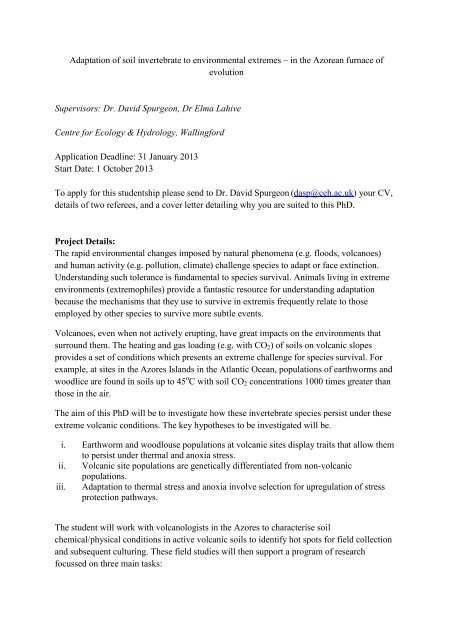
![Aquatic bryophytes/lower plants [1.54MB, PDF] - Centre for Ecology ...](https://img.yumpu.com/16155793/1/190x143/aquatic-bryophytes-lower-plants-154mb-pdf-centre-for-ecology-.jpg?quality=85)
